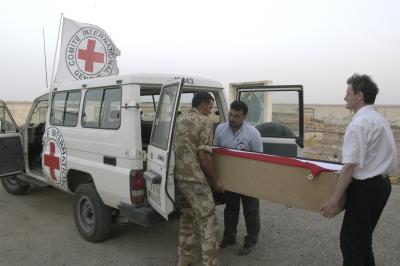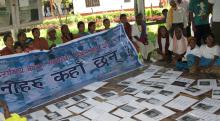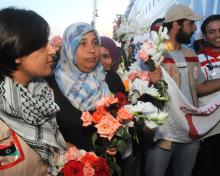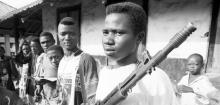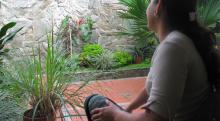Basic international humanitarian law (IHL) rules applicable to this situation:
Whenever possible, and particularly after an engagement, each party to the conflict must, without delay, take all possible measures to search for, collect and evacuate the dead without adverse distinction.
Each party to the conflict must take all possible measures to prevent the dead from being despoiled.
To facilitate identification of the dead, each party to the conflict must record all available information prior to disposal and mark the location of the graves.
Each party to the conflict must take all feasible measures to account for persons reported missing in connection with armed conflict and must provide their family members with any information it has on their fate.
The case in brief
In 2014, an armed conflict broke out between the Iraqi government and the Islamic State group (ISg, also known as Da’esh/Islamic State in Iraq and the Levant, ISIL), a non-state armed group, over control of Iraqi territory. When the ISg captured Iraq’s Sinjar region, mass killings were reported and thousands of people left unaccounted for.
In 2019 and 2020 Iraqi authorities, in cooperation with international organizations, embarked on exhuming, identifying and handing over to families the remains of the dead. The United Nations Investigative Team to Promote Accountability for Crimes Committed by Da’esh/ISIL (UNITAD) provided forensic and legal expertise to ensure compliance with international standards and strengthened Iraqi forensic capacity.
IHL compliance highlights
- In March 2019 and October 2020, with UNITAD support, the Iraqi authorities exhumed mass graves in Sinjar in the presence of affected community members, including relatives of the missing. The remains were carefully transported to Baghdad for forensic testing in a specially adapted vehicle. Throughout the process:
- international forensic experts ensured adherence to international standards and best practices
- relatives of the missing were informed of progress and procedures relating to the identification and return of remains to families.
- In 2020, the Iraqi Prime Minister’s Office confirmed the government’s commitment to exhuming all such graves to accord the dead and their families due respect.
Case prepared by Maria Querol Guillen and Eliza Walsh, LL.M. students at Leiden University, under the supervision of Professor Robert Heinsch, as well as Alla Ershova (Senior Researcher) and Ashley Peltier (Researcher), Kalshoven-Gieskes Forum, Leiden University.
A. IRAQI GOVERNMENT EXHUMES MASS GRAVE IN SINJAR
[Source: ‘Government of Iraq, UNITAD conclude first Sinjar mass grave exhumation in Kojo village’, 21 March 2019, available at https://reliefweb.int/report/iraq/government-iraq-unitad-conclude-first-sinjar-mass-grave-exhumation-kojo-village, accessed on 31 January 2021]
[...] UNITAD (United Nations Investigative Team to Promote Accountability for Crimes Committed by Da’esh/ISIL) announced this morning the completion of the first exhumation of a Yazidi mass grave in the Sinjar region, in the village of Kojo. UNITAD reports that the victims’ remains and associated evidence have safely arrived at the Medico-Legal Directorate in Baghdad.
The exhumation was conducted by the Mass Graves Directorate within the Martyrs’ Foundation, the Medico-Legal Directorate under the Iraqi Ministry of Health, and the Ministry of Martyrs and Anfal of the Kurdistan Regional Government, guided and supported by UNITAD’s team of forensic and legal experts.
[...]
[T]he investigation team excavated the site, successfully exposing the remains of up to 30 individuals. The precise number will be confirmed following forensic analysis at the Medico-Legal Directorate in Baghdad.
Concluding the five-day exhumation process, the remains were extracted from the site and stored in a specially adapted secure vehicle for transportation to Baghdad.
UNITAD Special Adviser and Head of the Investigative Team Karim A. A. Khan QC stated: “UNITAD extends its sincere gratitude to the crime scene investigation and forensic teams of the Government of Iraq. Their work during the exhumation process, guided by UNITAD specialists, was completed in line with international best practices, and their commitment to this work, has been exemplary.”
[...]
B. THE IRAQI GOVERNMENT CONTINUES TO EXHUME MASS GRAVES
[Source: ‘Government of Iraq Resumes Excavation Activities; Opens Two New Yazidi Mass Graves’, 28 October 2020, available at https://reliefweb.int/report/iraq/government-iraq-resumes-exhumation-activities-opens-two-new-yazidi-mass-graves-isil-enar accessed on 20 May 2022]
[...] After pausing activities due to the COVID-19 pandemic, Iraqi authorities have resumed the exhumations of mass graves, with support from […] (UNITAD) and the International Committee for Missing Persons (ICMP), and in cooperation with the International Organization for Migration (IOM) and the Yazda Organization.
On Saturday (24/10) Iraqi experts from the Mass Graves Directorate (MGD), under the leadership of Mr. Dia’ Karim Sa’idi, and the Medico-Legal Directorate (MLD), under the leadership of Dr. Zeid Ali Abbas, started exhumations in the mass graves left by ISIL in Solagh and Kojo, Ninewa Governorate.
Representatives of the Government of Iraq, the National Coordination Committee (NCC), the Yazidi community, UNITAD, ICMP, and IOM were in attendance. Also attending were around 300 people, including many relatives of missing persons.
[...]
During his speech at the ceremony Mr. Saad Abdali, Member of the Advisory Committee at the Prime Minister Office and Head of Coordination in the NCC, affirmed the Government of Iraq’s dedication to honoring the victims and attending to this tragedy with the due respect and reverence it deserves. He announced that the Government of Iraq has made future plans to open all mass graves and honor all the martyrs. He added: “as we stand today upon these pure bodies, and in front of the families of the victims, we bow in respect and honor of your gracious sacrifices, full of hope that this cruel experience becomes a starting point for us to come together to build our homeland.”
[...]
C. CIVIL SOCIETY WELCOMES EXHUMATIONS IN SINJAR
[Source: Yazda, ‘Nadia Murad, Yazda and Amal Clooney welcome the start of exhumation activities in Kocho, Sinjar’, 12 March 2019, available at https://www.doughtystreet.co.uk/news/nadia-murad-yazda-and-amal-clooney-welcome-start-exhumation-activities-kocho-sinjar , accessed on 20 May 2022]
[...] Nobel Peace Prize Laureate Nadia Murad, global Yazidi NGO Yazda, and their joint legal counsel Amal Clooney welcome this important milestone in the investigation of crimes committed by ISIS against the Yazidi minority in Iraq.
[...]
We welcome the cooperative approach adopted by the Iraqi authorities and UNITAD in the preparation for and implementation of the scheduled exhumation activities, and the involvement of international forensic experts tasked to ensure that international standards and best practices will be applied throughout the exhumation process.
[…]
We also welcome the involvement of representatives of the Yazidi community in the lead-up to the excavation and we call for this engagement of victim communities to continue throughout the exhumation process. Members of the Yazidi minority, and in particular survivors and relatives of the victims of ISIS, should continue to be duly consulted and informed about the progress of the planned exhumations, including the treatment of remains and their identification and the proposed timeframe and procedure for the repatriation of remains to their families to allow their burial in accordance with Yazidi religious rites.
[…]
D. EXHUMATIONS IN IRAQ HELP BRING CLOSURE TO FAMILIES
[Source: Government of Iraq, ‘UNITAD conclude first Sinjar mass grave exhumation in Kojo village’, 21 March 2019, available at
https://reliefweb.int/report/iraq/government-iraq-resumes-exhumation-activities-opens-two-new-yazidi-mass-graves-isil-enar accessed on 20 May 2022]
[...] The exhumation process was preceded by a memorial ceremony in Kojo, attended by H.E. Dr. Mahdi Al-Alaq, the Secretary-General of the Council of Ministers, alongside other senior level government representatives.
[...]
Following the memorial service, His Holiness Baba Sheikh Khurto Hajji Ismail and senior clergy led the several hundred attendees, many themselves survivors of Da’esh crimes and relatives of those killed or abducted, in a religious ceremony at the grave site, which concluded with the release of white doves, the universal symbol of peace.
[...]
[Source: ‘Government of Iraq Resumes Excavation Activities; Opens Two New Yazidi Mass Graves’, 28 October 2020, available at https://www.unitad.un.org/news/government-iraq-resumes-exhumation-activities-opens-two-new-yazidi-mass-graves-isil, accessed on 31 January 2021]
[...] [Special Adviser and Head of UNITAD Karim A. A. Khan QC] highlighted the important work that MGD and MLD are doing for the families and the accountability they call for, reaffirming that UNITAD — with international grants from the United States, the United Kingdom, Germany, Netherlands, the European Union and others — will continue to support the capacity building of national Iraqi forensic teams including the investigations and exhumation operations they conduct.
ICMP Iraq Program Deputy Head Fawaz Abdulabbas said:
“All of us here hope that the work that begins today will ease the pain for some of the many Yezidi families with missing relatives by unearthing the remains of their loved ones. ICMP supports Iraq’s efforts to secure the rights of Yazidi victims of Da’esh crimes through proper investigations and DNA -based identifications. These efforts are important, not only to the many families who suffer every day because relatives are missing, but to society as a whole. Accounting for the missing is an investment in peace and stability.”
Psychosocial Support
Exhumations are painful processes that are likely to trigger a wide range of difficult emotions such as sadness, anxiety, anger, loneliness or fear. In anticipation of the emotional burden, UNITAD’s psychology team assisted with the coordination of psychosocial support to families and the communities through direct involvement of Yazda and IOM. IOM’s MHPSS [Mental Health and Psychosocial Support] team arranged discussion groups with the community members to ascertain their expectations and needs prior to the exhumation day. IOM also conducted a training on psychological first aid to prepare the staff who were deployed to provide support on the day. Individual mental health and psycho-social support was provided by over 20 of Yazda and IOM’s psychologists and psychosocial workers on site, to help alleviate the distress of the bereaved families. The MHPSS teams were deployed to the area throughout the day to provide emotional and practical support to bereaved families.
[...]
The remains of the victims will then be returned to their families, giving them the opportunity to lay them to rest appropriately and according to traditions. ICMP and UNITAD work with the MGD and MLD to ensure the process is conducted according to international standards.
Discussion
I. Classification of the Situation and Applicable law
1. How would you classify the situation in Iraq in 2014? What additional information would you need to make this determination? (GC I-V, Art. 2, Art. 3; P I, Art. 1; P II, Art 1)
2. What IHL obligations do the parties to a conflict have regarding dead persons in an international and non-international armed conflict? Which of these instruments are applicable to Iraq? (P I, Art. 33, Art. 34; P II, Art. 8; CIHL Rules 112, 113, 114, 116)
II. Obligations Regarding Dead Persons
3. Although the deaths in the region occurred in 2014, the exhumations started taking place in 2019. Do the obligations regarding the search and exhumation of the dead have any temporal or other kind of limitation? (CIHL Rules 112, 113)
4. What type of protection do the family members of the missing and dead have under IHL? What is the purpose of giving these protections to families under IHL? ( GC IV, Art. 25, Art. 26 Art. 130; P I, Art. 32, Art. 34; CIHL Rules 116, 117)
III. Elements Contributing to Respect for IHL
5. (Documents B and D) The Government of Iraq has publicly honoured the victims during the exhumations. In your opinion, what is the significance of publicly recognizing the victims? What effect do public ceremonies have on surviving family members?
6. (Document D, Source 2) What role, if any, should psychosocial assistance play in these activities? How does this assistance contribute to respect for the rights guaranteed to the families under IHL?
7. (Document D, Source 2) Fawaz Abdulabbas, ICMP’s Iraq Program Deputy Head, states that “[a]ccounting for the missing is an investment in peace and stability”. In what ways do you think that exhumations and identification of the dead can help reconcile societies after a conflict?
8. (Documents C and D) What role do the international activists and civil society have in influencing parties to comply with IHL? Do you think compliance can positively contribute to the public opinion or international reputation of a party to the conflict?
9. (Documents A, B, C, and D, Source 2) The international community and international organizations, including the ICMP and UNITAD, have assisted the Iraqi authorities in their exhumation efforts. What role did these organisations play in assisting the Iraqi government to comply with IHL? Is this the same role as that of the foreign governments who provided international grants?

